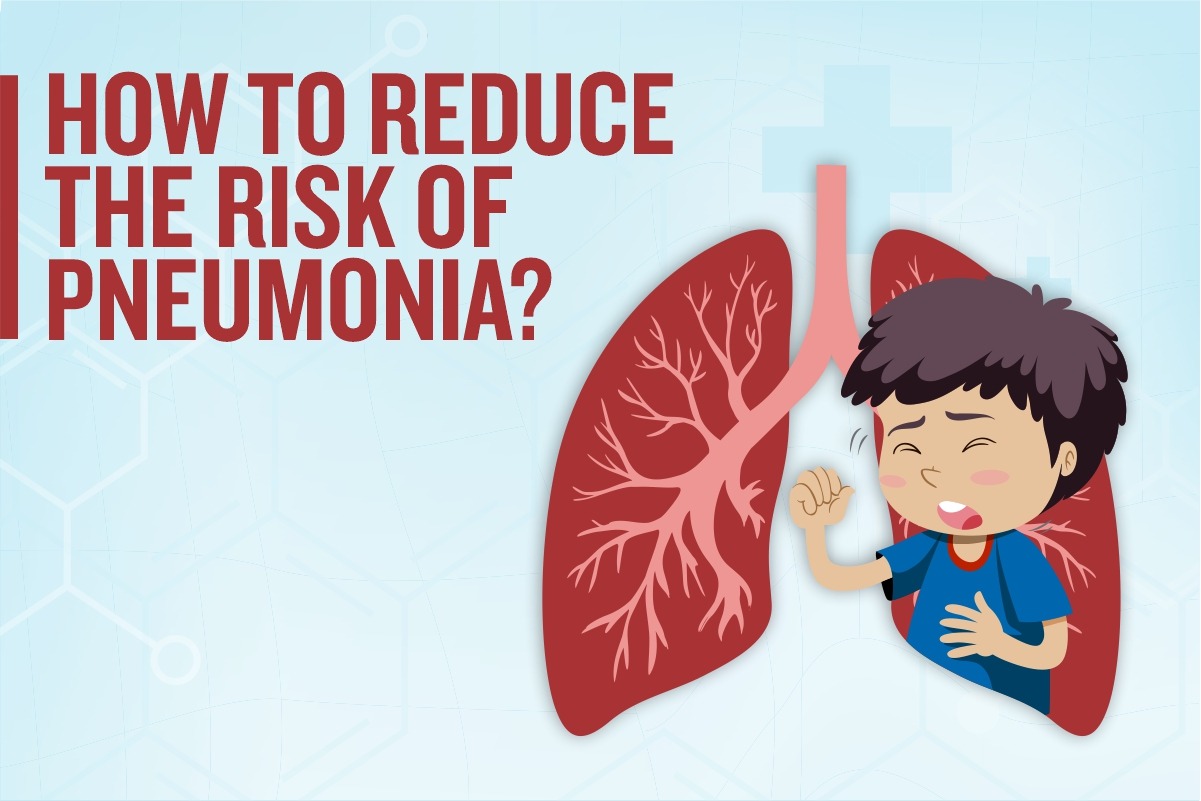Understanding IVF
Jul 25, 2024

Pneumonia is a common but dangerous respiratory illness that affects millions of Indians every year. It is treatable but can become quite serious for the elderly, young children, & people with underlying medical conditions. It is important to know how to reduce the risk of pneumonia, especially for people who are at high risk.
It is caused by viruses, bacteria, or fungi, and a person with pneumonia might show symptoms, including rapid breathing, chest pain, coughing, shortness of breath, sweating, & fever. Treatment involves antibiotics, ample rest, and fluids.
We can take several measures to avoid the risk of this deadly disease, the majority of which are easy-to-follow lifestyle changes and a matter of hygiene and health practices. Let’s discuss them.
The best method to reduce the risk of pneumonia is to get vaccinated. There are two types of vaccines available: the pneumococcal polysaccharide vaccine (PPSV23) and the pneumococcal conjugate vaccine (PCV13). PCV13 protects against thirteen types of pneumococcal bacteria and is recommended for all children younger than five years old. Vaccination against the flu and pneumococcal disease is especially important for people over 65 years, people with chronic medical conditions, and people who smoke cigarettes.
There are a host of respiratory system illnesses that can be avoided through common methods. Since pathogens of most respiratory illnesses like pneumonia enter the body through the respiratory canal and are mostly spread by airborne droplets, we can follow the basic covid-time protocols to avoid catching pneumonia.
All this means that the risk of pneumonia can be considerably reduced by following safety protocols that we learned during the Covid pandemic: The safety protocols required us to practice good hygiene and wash our hands regularly and thoroughly and mask up when in contact with people who are sick.
If your immune system is weak, your odds of contracting pneumonia are high. The first step in avoiding pneumonia is awareness of the strength of the immune system. It can happen due to diseases that affect the immune system, like AIDS or if you are taking medicines suppressing the immune system, like corticosteroids. Kids with weakened immunity are at risk of contracting pneumonia. A newborn’s lack of nutrition and underdeveloped immune system can also lead to pneumonia.
Once we have identified who is at a greater risk of contracting pneumonia, we can follow health safety protocols with more rigour around them and protect them from exposure to a polluted or infected environment.
Another factor that can lead to a person being susceptible to pneumonia is exposure to environmental factors. Indoor air pollution is caused by cooking & heating with biomass fuels (such as wood or cow dung) and living in crowded living conditions in homes where family members smoke.
Moreover, living in some cities with very high environmental pollution rates, like Delhi, can make one more susceptible to pneumonia. It is prudent to use indoor air filters and high-grade masks in such areas.
It is important to eat a well-balanced & healthy diet and perform enough exercise. This will help keep your immune system strong and reduce your risk of developing pneumonia. The value of maintaining a healthy lifestyle with sufficient physical activity every day can never be a miss.
Often respiratory ailments start small and get aggravated into serious conditions like pneumonia when not addressed in time. Respiratory ailments like the common cold, influenza, and pneumonia have similar symptoms, and identifying them is key to early diagnosis, which is important for a sure cure. When you have a cold, your nose is runny, and you might have a cough. But when you have pneumonia, your symptoms are much worse, like high fever, shaking chills, and pain in your chest.
Influenza and pneumonia have common symptoms, too. However, there are some important differences between influenza and pneumonia. Influenza is usually more severe, with symptoms that can include high fever, muscle aches, and fatigue. Pneumonia often starts slowly, with milder symptoms like a cough or chest pain.
If you do suspect pneumonia, see your doctor right away. Early diagnosis & treatment are the keys to better recovery. It is important to take all of the antibiotics & follow lifestyle advice as prescribed by the doctor, even if you start feeling better before you finish them all.
Pneumonia is only deadly when not diagnosed & treated in time. Being aware of how and where it spreads can help us take sufficient precautions. While pneumonia in itself is a fatal disease, it can easily be avoided with common health and hygiene practices.
Consultant – Respiratory, Critical Care and Sleep Medicine
Metro Heart Institute with Multispecialty Faridabad
For More visit : https://www.metrohospitalfaridabad.com/doctor/dr-loveleen-mangla/